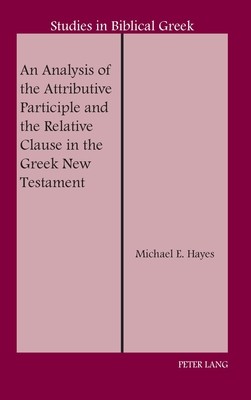
- We will send in 10–14 business days.
- Publisher: Peter Lang Inc., International Academic Publishers
- ISBN-10: 1433135078
- ISBN-13: 9781433135071
- Format: 15.2 x 22.6 x 2.8 cm, hardcover
- Language: English
- SAVE -10% with code: EXTRA
An Analysis of the Attributive Participle and the Relative Clause in the Greek New Testament (e-book) (used book) | bookbook.eu
Reviews
Description
Many New Testament Greek grammarians assert that the Greek attributive participle and the Greek relative clause are "equivalent." Michael E. Hayes disproves those assertions in An Analysis of the Attributive Participle and the Relative Clause in the Greek New Testament, thoroughly presenting the linguistic categories of restrictivity and nonrestrictivity and analyzing the restrictive/nonrestrictive nature of every attributive participle and relative clause. By employing the Accessibility Hierarchy, he focuses the central and critical analysis to the subject relative clause and the attributive participle. His analysis leads to the conclusion that with respect to the restrictive/nonrestrictive distinction these two constructions could in no way be described as "equivalent." The attributive participle is primarily utilized to restrict its antecedent except under certain prescribed circumstances, and when both constructions are grammatically and stylistically feasible, the relative clause is predominantly utilized to relate nonrestrictively to its antecedent. As a result, Hayes issues a call to clarity and correction for grammarians, exegetes, modern editors, and translators of the Greek New Testament.
EXTRA 10 % discount with code: EXTRA
The promotion ends in 11d.04:19:17
The discount code is valid when purchasing from 10 €. Discounts do not stack.
- Publisher: Peter Lang Inc., International Academic Publishers
- ISBN-10: 1433135078
- ISBN-13: 9781433135071
- Format: 15.2 x 22.6 x 2.8 cm, hardcover
- Language: English English
Many New Testament Greek grammarians assert that the Greek attributive participle and the Greek relative clause are "equivalent." Michael E. Hayes disproves those assertions in An Analysis of the Attributive Participle and the Relative Clause in the Greek New Testament, thoroughly presenting the linguistic categories of restrictivity and nonrestrictivity and analyzing the restrictive/nonrestrictive nature of every attributive participle and relative clause. By employing the Accessibility Hierarchy, he focuses the central and critical analysis to the subject relative clause and the attributive participle. His analysis leads to the conclusion that with respect to the restrictive/nonrestrictive distinction these two constructions could in no way be described as "equivalent." The attributive participle is primarily utilized to restrict its antecedent except under certain prescribed circumstances, and when both constructions are grammatically and stylistically feasible, the relative clause is predominantly utilized to relate nonrestrictively to its antecedent. As a result, Hayes issues a call to clarity and correction for grammarians, exegetes, modern editors, and translators of the Greek New Testament.


Reviews